Relationship between Schools and Other Providers of Learning for 14-19 Age Range
VerifiedAdded on 2023/01/06
|15
|4983
|28
AI Summary
This document analyzes the relationship between schools and other providers of learning for the 14-19 age range. It explores higher-level qualifications, specialized teaching, and increasing flexibility of provision. The document also discusses teaching, learning, and assessment approaches for 14-19 learners, including the use of information and learning technology and project work to develop research skills. Legal requirements and their impact on teaching practices are also examined.
Contribute Materials
Your contribution can guide someone’s learning journey. Share your
documents today.
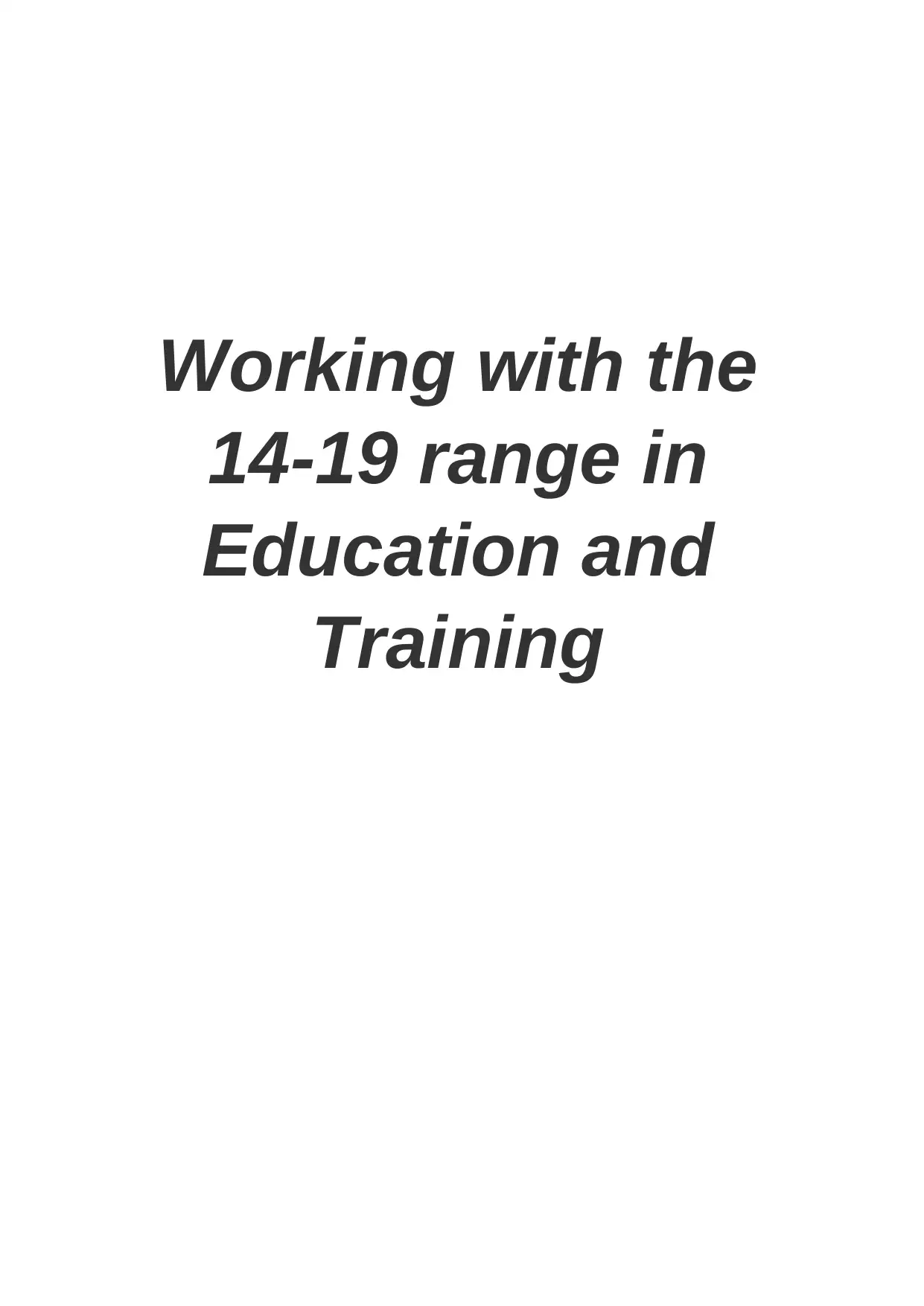
Working with the
14-19 range in
Education and
Training
14-19 range in
Education and
Training
Secure Best Marks with AI Grader
Need help grading? Try our AI Grader for instant feedback on your assignments.
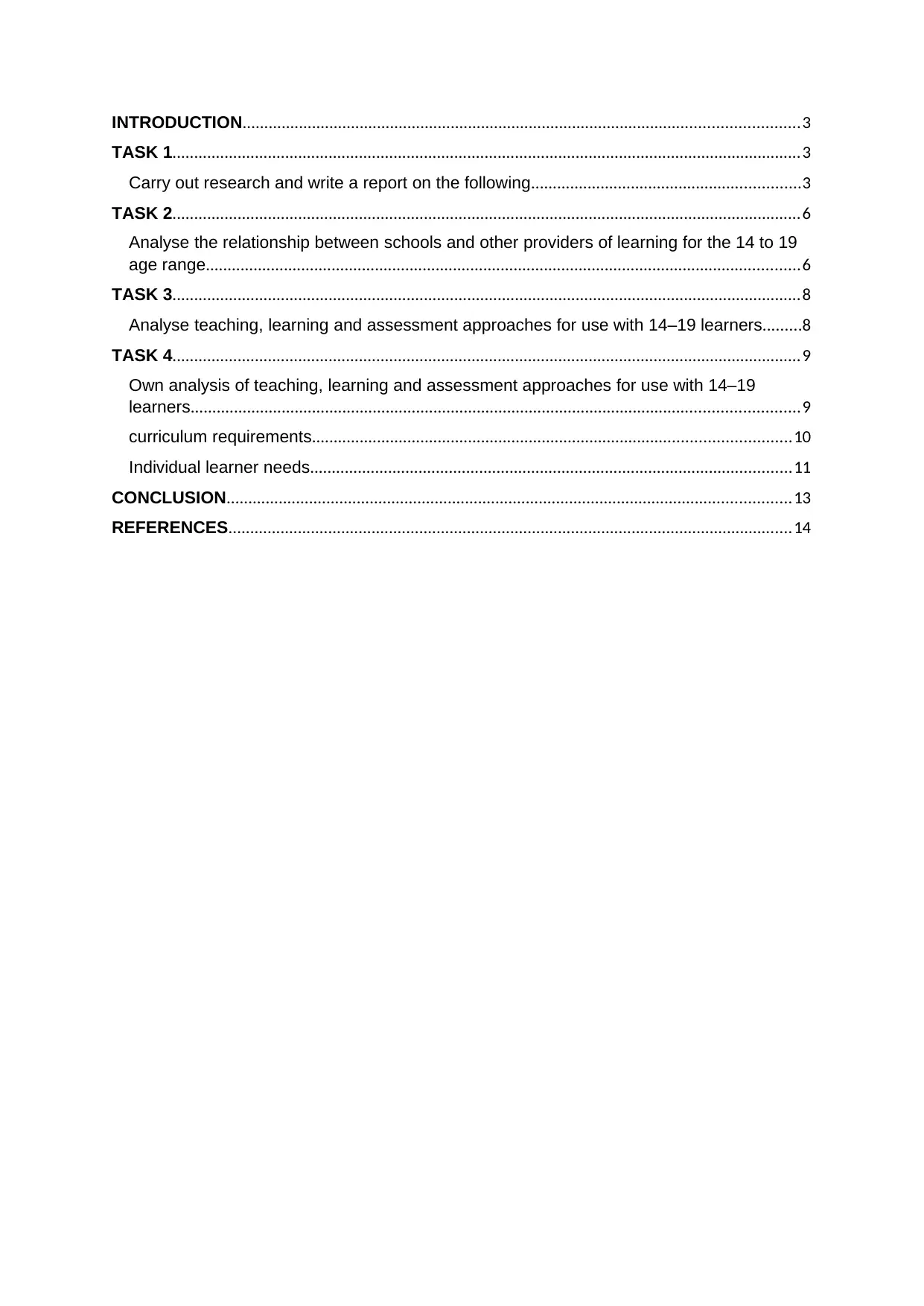
INTRODUCTION................................................................................................................................3
TASK 1.................................................................................................................................................3
Carry out research and write a report on the following..............................................................3
TASK 2.................................................................................................................................................6
Analyse the relationship between schools and other providers of learning for the 14 to 19
age range.........................................................................................................................................6
TASK 3.................................................................................................................................................8
Analyse teaching, learning and assessment approaches for use with 14–19 learners.........8
TASK 4.................................................................................................................................................9
Own analysis of teaching, learning and assessment approaches for use with 14–19
learners............................................................................................................................................9
curriculum requirements..............................................................................................................10
Individual learner needs...............................................................................................................11
CONCLUSION..................................................................................................................................13
REFERENCES..................................................................................................................................14
TASK 1.................................................................................................................................................3
Carry out research and write a report on the following..............................................................3
TASK 2.................................................................................................................................................6
Analyse the relationship between schools and other providers of learning for the 14 to 19
age range.........................................................................................................................................6
TASK 3.................................................................................................................................................8
Analyse teaching, learning and assessment approaches for use with 14–19 learners.........8
TASK 4.................................................................................................................................................9
Own analysis of teaching, learning and assessment approaches for use with 14–19
learners............................................................................................................................................9
curriculum requirements..............................................................................................................10
Individual learner needs...............................................................................................................11
CONCLUSION..................................................................................................................................13
REFERENCES..................................................................................................................................14
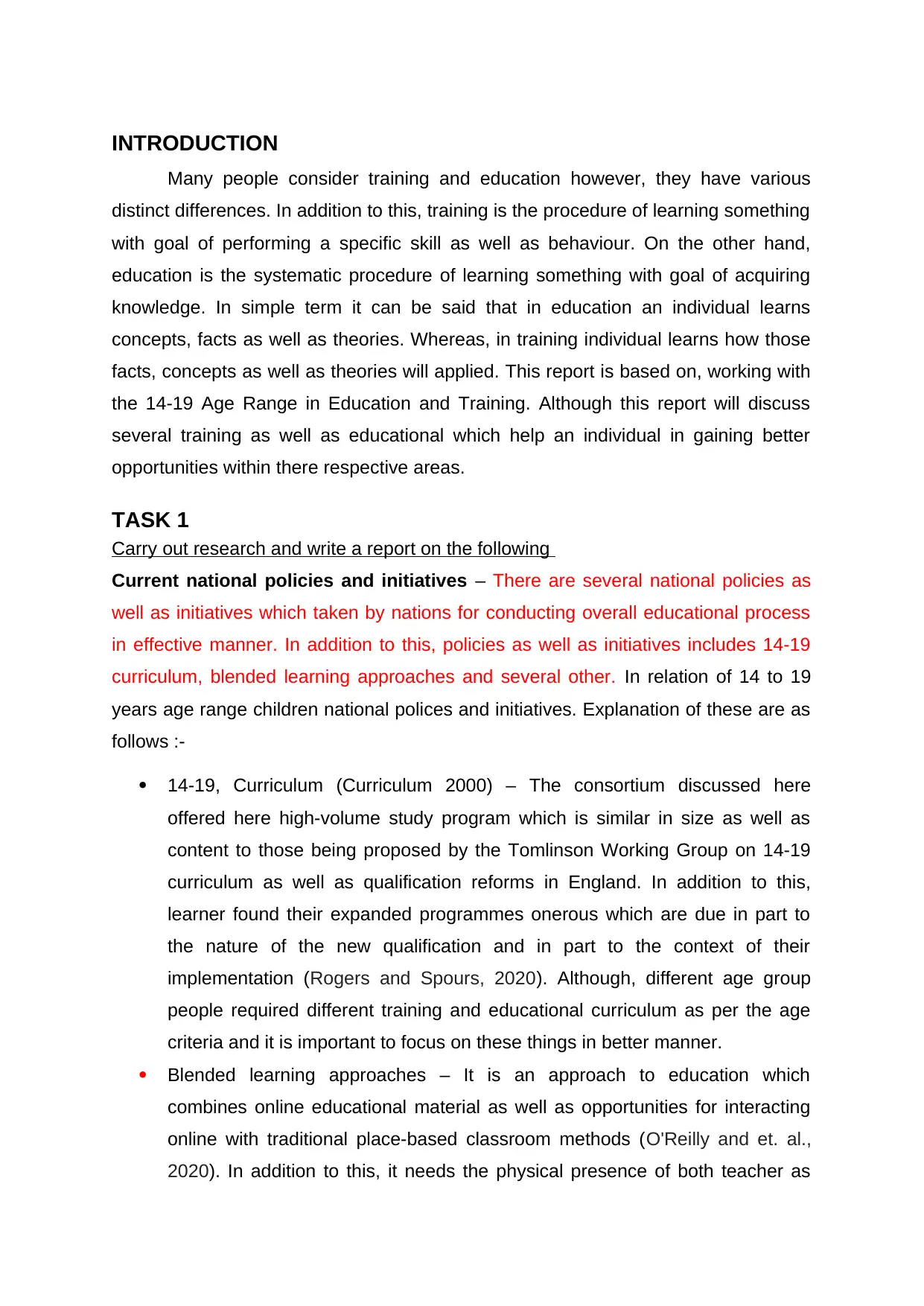
INTRODUCTION
Many people consider training and education however, they have various
distinct differences. In addition to this, training is the procedure of learning something
with goal of performing a specific skill as well as behaviour. On the other hand,
education is the systematic procedure of learning something with goal of acquiring
knowledge. In simple term it can be said that in education an individual learns
concepts, facts as well as theories. Whereas, in training individual learns how those
facts, concepts as well as theories will applied. This report is based on, working with
the 14-19 Age Range in Education and Training. Although this report will discuss
several training as well as educational which help an individual in gaining better
opportunities within there respective areas.
TASK 1
Carry out research and write a report on the following
Current national policies and initiatives – There are several national policies as
well as initiatives which taken by nations for conducting overall educational process
in effective manner. In addition to this, policies as well as initiatives includes 14-19
curriculum, blended learning approaches and several other. In relation of 14 to 19
years age range children national polices and initiatives. Explanation of these are as
follows :-
14-19, Curriculum (Curriculum 2000) – The consortium discussed here
offered here high-volume study program which is similar in size as well as
content to those being proposed by the Tomlinson Working Group on 14-19
curriculum as well as qualification reforms in England. In addition to this,
learner found their expanded programmes onerous which are due in part to
the nature of the new qualification and in part to the context of their
implementation (Rogers and Spours, 2020). Although, different age group
people required different training and educational curriculum as per the age
criteria and it is important to focus on these things in better manner.
Blended learning approaches – It is an approach to education which
combines online educational material as well as opportunities for interacting
online with traditional place-based classroom methods (O'Reilly and et. al.,
2020). In addition to this, it needs the physical presence of both teacher as
Many people consider training and education however, they have various
distinct differences. In addition to this, training is the procedure of learning something
with goal of performing a specific skill as well as behaviour. On the other hand,
education is the systematic procedure of learning something with goal of acquiring
knowledge. In simple term it can be said that in education an individual learns
concepts, facts as well as theories. Whereas, in training individual learns how those
facts, concepts as well as theories will applied. This report is based on, working with
the 14-19 Age Range in Education and Training. Although this report will discuss
several training as well as educational which help an individual in gaining better
opportunities within there respective areas.
TASK 1
Carry out research and write a report on the following
Current national policies and initiatives – There are several national policies as
well as initiatives which taken by nations for conducting overall educational process
in effective manner. In addition to this, policies as well as initiatives includes 14-19
curriculum, blended learning approaches and several other. In relation of 14 to 19
years age range children national polices and initiatives. Explanation of these are as
follows :-
14-19, Curriculum (Curriculum 2000) – The consortium discussed here
offered here high-volume study program which is similar in size as well as
content to those being proposed by the Tomlinson Working Group on 14-19
curriculum as well as qualification reforms in England. In addition to this,
learner found their expanded programmes onerous which are due in part to
the nature of the new qualification and in part to the context of their
implementation (Rogers and Spours, 2020). Although, different age group
people required different training and educational curriculum as per the age
criteria and it is important to focus on these things in better manner.
Blended learning approaches – It is an approach to education which
combines online educational material as well as opportunities for interacting
online with traditional place-based classroom methods (O'Reilly and et. al.,
2020). In addition to this, it needs the physical presence of both teacher as
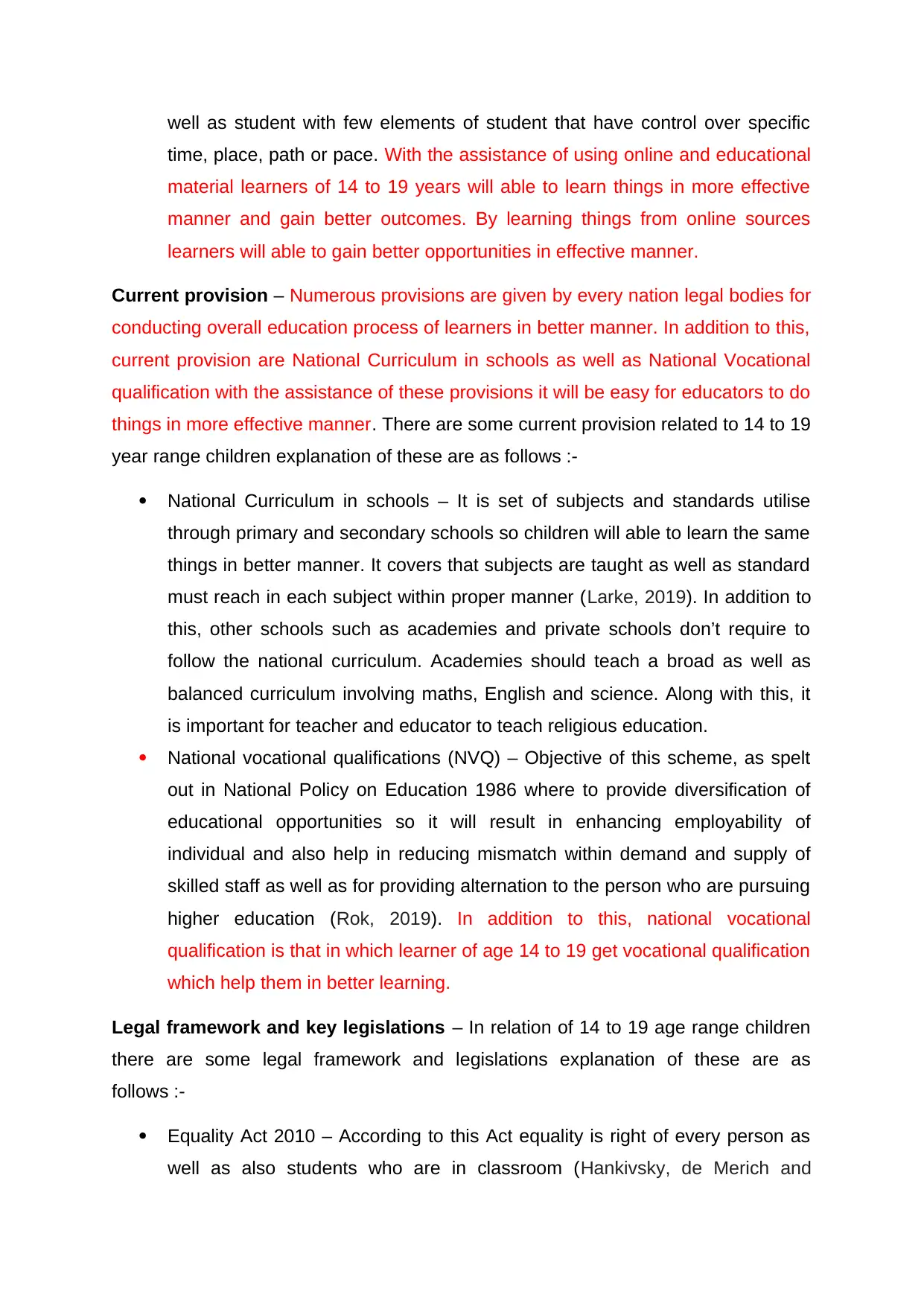
well as student with few elements of student that have control over specific
time, place, path or pace. With the assistance of using online and educational
material learners of 14 to 19 years will able to learn things in more effective
manner and gain better outcomes. By learning things from online sources
learners will able to gain better opportunities in effective manner.
Current provision – Numerous provisions are given by every nation legal bodies for
conducting overall education process of learners in better manner. In addition to this,
current provision are National Curriculum in schools as well as National Vocational
qualification with the assistance of these provisions it will be easy for educators to do
things in more effective manner. There are some current provision related to 14 to 19
year range children explanation of these are as follows :-
National Curriculum in schools – It is set of subjects and standards utilise
through primary and secondary schools so children will able to learn the same
things in better manner. It covers that subjects are taught as well as standard
must reach in each subject within proper manner (Larke, 2019). In addition to
this, other schools such as academies and private schools don’t require to
follow the national curriculum. Academies should teach a broad as well as
balanced curriculum involving maths, English and science. Along with this, it
is important for teacher and educator to teach religious education.
National vocational qualifications (NVQ) – Objective of this scheme, as spelt
out in National Policy on Education 1986 where to provide diversification of
educational opportunities so it will result in enhancing employability of
individual and also help in reducing mismatch within demand and supply of
skilled staff as well as for providing alternation to the person who are pursuing
higher education (Rok, 2019). In addition to this, national vocational
qualification is that in which learner of age 14 to 19 get vocational qualification
which help them in better learning.
Legal framework and key legislations – In relation of 14 to 19 age range children
there are some legal framework and legislations explanation of these are as
follows :-
Equality Act 2010 – According to this Act equality is right of every person as
well as also students who are in classroom (Hankivsky, de Merich and
time, place, path or pace. With the assistance of using online and educational
material learners of 14 to 19 years will able to learn things in more effective
manner and gain better outcomes. By learning things from online sources
learners will able to gain better opportunities in effective manner.
Current provision – Numerous provisions are given by every nation legal bodies for
conducting overall education process of learners in better manner. In addition to this,
current provision are National Curriculum in schools as well as National Vocational
qualification with the assistance of these provisions it will be easy for educators to do
things in more effective manner. There are some current provision related to 14 to 19
year range children explanation of these are as follows :-
National Curriculum in schools – It is set of subjects and standards utilise
through primary and secondary schools so children will able to learn the same
things in better manner. It covers that subjects are taught as well as standard
must reach in each subject within proper manner (Larke, 2019). In addition to
this, other schools such as academies and private schools don’t require to
follow the national curriculum. Academies should teach a broad as well as
balanced curriculum involving maths, English and science. Along with this, it
is important for teacher and educator to teach religious education.
National vocational qualifications (NVQ) – Objective of this scheme, as spelt
out in National Policy on Education 1986 where to provide diversification of
educational opportunities so it will result in enhancing employability of
individual and also help in reducing mismatch within demand and supply of
skilled staff as well as for providing alternation to the person who are pursuing
higher education (Rok, 2019). In addition to this, national vocational
qualification is that in which learner of age 14 to 19 get vocational qualification
which help them in better learning.
Legal framework and key legislations – In relation of 14 to 19 age range children
there are some legal framework and legislations explanation of these are as
follows :-
Equality Act 2010 – According to this Act equality is right of every person as
well as also students who are in classroom (Hankivsky, de Merich and
Secure Best Marks with AI Grader
Need help grading? Try our AI Grader for instant feedback on your assignments.
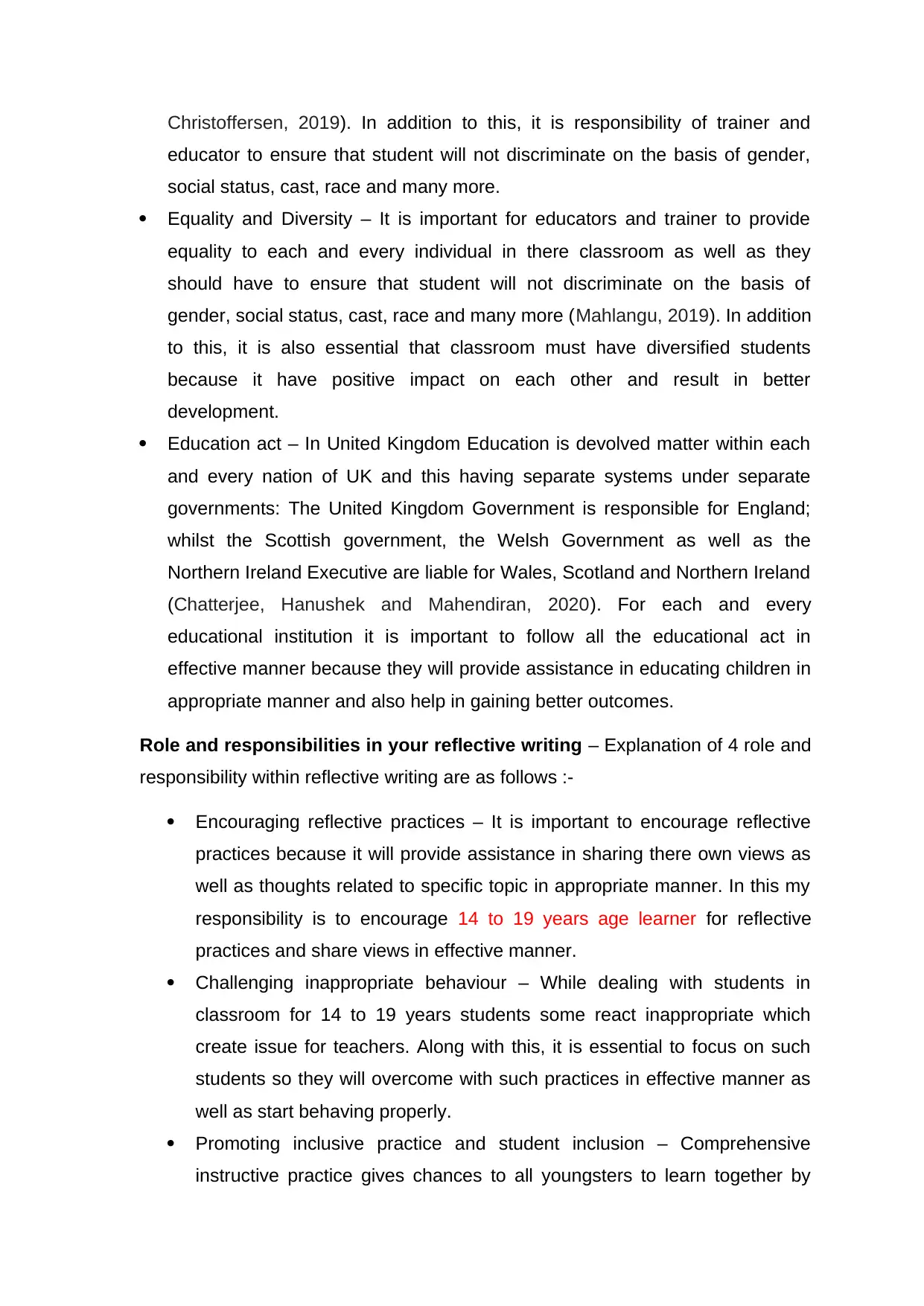
Christoffersen, 2019). In addition to this, it is responsibility of trainer and
educator to ensure that student will not discriminate on the basis of gender,
social status, cast, race and many more.
Equality and Diversity – It is important for educators and trainer to provide
equality to each and every individual in there classroom as well as they
should have to ensure that student will not discriminate on the basis of
gender, social status, cast, race and many more (Mahlangu, 2019). In addition
to this, it is also essential that classroom must have diversified students
because it have positive impact on each other and result in better
development.
Education act – In United Kingdom Education is devolved matter within each
and every nation of UK and this having separate systems under separate
governments: The United Kingdom Government is responsible for England;
whilst the Scottish government, the Welsh Government as well as the
Northern Ireland Executive are liable for Wales, Scotland and Northern Ireland
(Chatterjee, Hanushek and Mahendiran, 2020). For each and every
educational institution it is important to follow all the educational act in
effective manner because they will provide assistance in educating children in
appropriate manner and also help in gaining better outcomes.
Role and responsibilities in your reflective writing – Explanation of 4 role and
responsibility within reflective writing are as follows :-
Encouraging reflective practices – It is important to encourage reflective
practices because it will provide assistance in sharing there own views as
well as thoughts related to specific topic in appropriate manner. In this my
responsibility is to encourage 14 to 19 years age learner for reflective
practices and share views in effective manner.
Challenging inappropriate behaviour – While dealing with students in
classroom for 14 to 19 years students some react inappropriate which
create issue for teachers. Along with this, it is essential to focus on such
students so they will overcome with such practices in effective manner as
well as start behaving properly.
Promoting inclusive practice and student inclusion – Comprehensive
instructive practice gives chances to all youngsters to learn together by
educator to ensure that student will not discriminate on the basis of gender,
social status, cast, race and many more.
Equality and Diversity – It is important for educators and trainer to provide
equality to each and every individual in there classroom as well as they
should have to ensure that student will not discriminate on the basis of
gender, social status, cast, race and many more (Mahlangu, 2019). In addition
to this, it is also essential that classroom must have diversified students
because it have positive impact on each other and result in better
development.
Education act – In United Kingdom Education is devolved matter within each
and every nation of UK and this having separate systems under separate
governments: The United Kingdom Government is responsible for England;
whilst the Scottish government, the Welsh Government as well as the
Northern Ireland Executive are liable for Wales, Scotland and Northern Ireland
(Chatterjee, Hanushek and Mahendiran, 2020). For each and every
educational institution it is important to follow all the educational act in
effective manner because they will provide assistance in educating children in
appropriate manner and also help in gaining better outcomes.
Role and responsibilities in your reflective writing – Explanation of 4 role and
responsibility within reflective writing are as follows :-
Encouraging reflective practices – It is important to encourage reflective
practices because it will provide assistance in sharing there own views as
well as thoughts related to specific topic in appropriate manner. In this my
responsibility is to encourage 14 to 19 years age learner for reflective
practices and share views in effective manner.
Challenging inappropriate behaviour – While dealing with students in
classroom for 14 to 19 years students some react inappropriate which
create issue for teachers. Along with this, it is essential to focus on such
students so they will overcome with such practices in effective manner as
well as start behaving properly.
Promoting inclusive practice and student inclusion – Comprehensive
instructive practice gives chances to all youngsters to learn together by
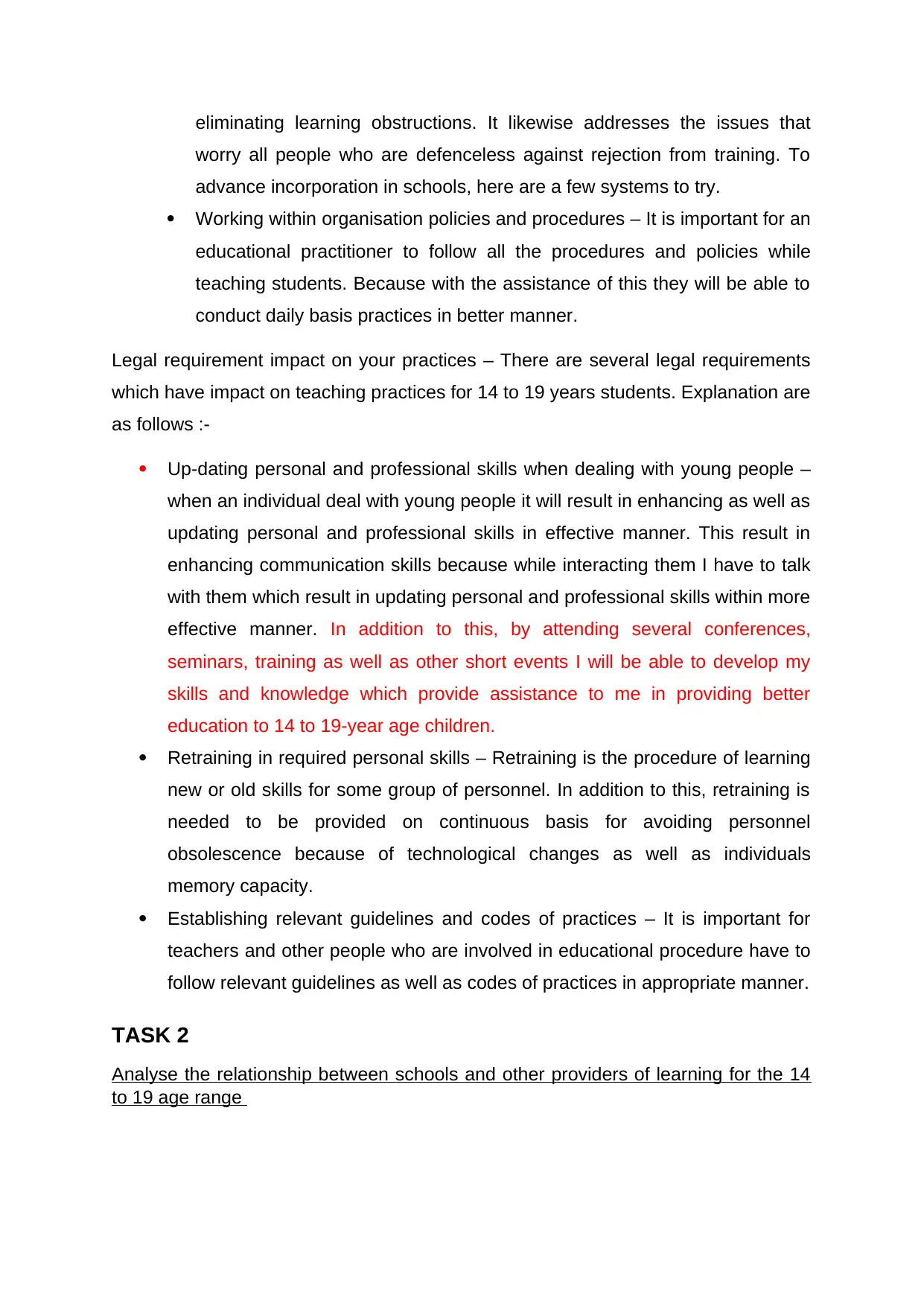
eliminating learning obstructions. It likewise addresses the issues that
worry all people who are defenceless against rejection from training. To
advance incorporation in schools, here are a few systems to try.
Working within organisation policies and procedures – It is important for an
educational practitioner to follow all the procedures and policies while
teaching students. Because with the assistance of this they will be able to
conduct daily basis practices in better manner.
Legal requirement impact on your practices – There are several legal requirements
which have impact on teaching practices for 14 to 19 years students. Explanation are
as follows :-
Up-dating personal and professional skills when dealing with young people –
when an individual deal with young people it will result in enhancing as well as
updating personal and professional skills in effective manner. This result in
enhancing communication skills because while interacting them I have to talk
with them which result in updating personal and professional skills within more
effective manner. In addition to this, by attending several conferences,
seminars, training as well as other short events I will be able to develop my
skills and knowledge which provide assistance to me in providing better
education to 14 to 19-year age children.
Retraining in required personal skills – Retraining is the procedure of learning
new or old skills for some group of personnel. In addition to this, retraining is
needed to be provided on continuous basis for avoiding personnel
obsolescence because of technological changes as well as individuals
memory capacity.
Establishing relevant guidelines and codes of practices – It is important for
teachers and other people who are involved in educational procedure have to
follow relevant guidelines as well as codes of practices in appropriate manner.
TASK 2
Analyse the relationship between schools and other providers of learning for the 14
to 19 age range
worry all people who are defenceless against rejection from training. To
advance incorporation in schools, here are a few systems to try.
Working within organisation policies and procedures – It is important for an
educational practitioner to follow all the procedures and policies while
teaching students. Because with the assistance of this they will be able to
conduct daily basis practices in better manner.
Legal requirement impact on your practices – There are several legal requirements
which have impact on teaching practices for 14 to 19 years students. Explanation are
as follows :-
Up-dating personal and professional skills when dealing with young people –
when an individual deal with young people it will result in enhancing as well as
updating personal and professional skills in effective manner. This result in
enhancing communication skills because while interacting them I have to talk
with them which result in updating personal and professional skills within more
effective manner. In addition to this, by attending several conferences,
seminars, training as well as other short events I will be able to develop my
skills and knowledge which provide assistance to me in providing better
education to 14 to 19-year age children.
Retraining in required personal skills – Retraining is the procedure of learning
new or old skills for some group of personnel. In addition to this, retraining is
needed to be provided on continuous basis for avoiding personnel
obsolescence because of technological changes as well as individuals
memory capacity.
Establishing relevant guidelines and codes of practices – It is important for
teachers and other people who are involved in educational procedure have to
follow relevant guidelines as well as codes of practices in appropriate manner.
TASK 2
Analyse the relationship between schools and other providers of learning for the 14
to 19 age range
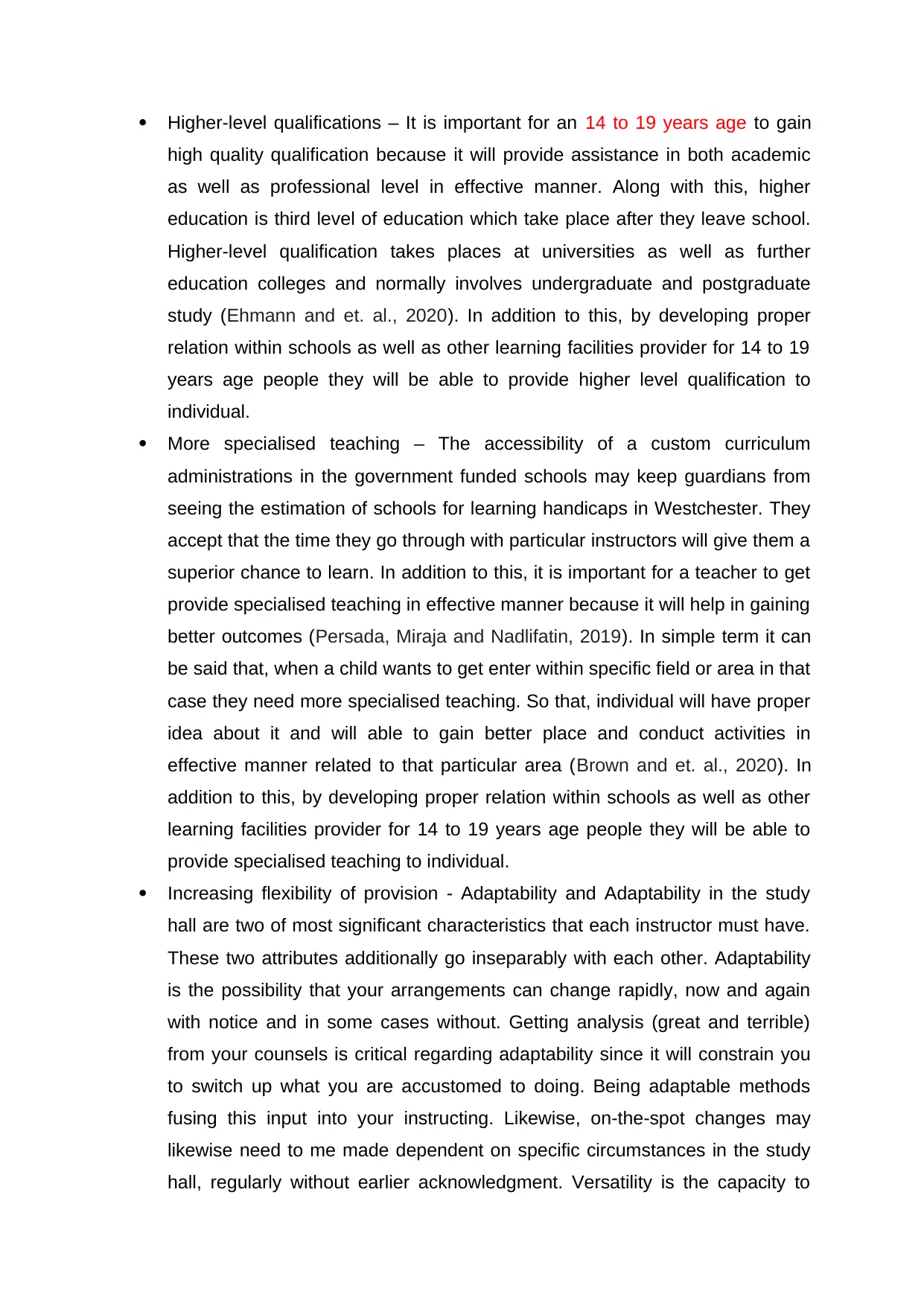
Higher-level qualifications – It is important for an 14 to 19 years age to gain
high quality qualification because it will provide assistance in both academic
as well as professional level in effective manner. Along with this, higher
education is third level of education which take place after they leave school.
Higher-level qualification takes places at universities as well as further
education colleges and normally involves undergraduate and postgraduate
study (Ehmann and et. al., 2020). In addition to this, by developing proper
relation within schools as well as other learning facilities provider for 14 to 19
years age people they will be able to provide higher level qualification to
individual.
More specialised teaching – The accessibility of a custom curriculum
administrations in the government funded schools may keep guardians from
seeing the estimation of schools for learning handicaps in Westchester. They
accept that the time they go through with particular instructors will give them a
superior chance to learn. In addition to this, it is important for a teacher to get
provide specialised teaching in effective manner because it will help in gaining
better outcomes (Persada, Miraja and Nadlifatin, 2019). In simple term it can
be said that, when a child wants to get enter within specific field or area in that
case they need more specialised teaching. So that, individual will have proper
idea about it and will able to gain better place and conduct activities in
effective manner related to that particular area (Brown and et. al., 2020). In
addition to this, by developing proper relation within schools as well as other
learning facilities provider for 14 to 19 years age people they will be able to
provide specialised teaching to individual.
Increasing flexibility of provision - Adaptability and Adaptability in the study
hall are two of most significant characteristics that each instructor must have.
These two attributes additionally go inseparably with each other. Adaptability
is the possibility that your arrangements can change rapidly, now and again
with notice and in some cases without. Getting analysis (great and terrible)
from your counsels is critical regarding adaptability since it will constrain you
to switch up what you are accustomed to doing. Being adaptable methods
fusing this input into your instructing. Likewise, on-the-spot changes may
likewise need to me made dependent on specific circumstances in the study
hall, regularly without earlier acknowledgment. Versatility is the capacity to
high quality qualification because it will provide assistance in both academic
as well as professional level in effective manner. Along with this, higher
education is third level of education which take place after they leave school.
Higher-level qualification takes places at universities as well as further
education colleges and normally involves undergraduate and postgraduate
study (Ehmann and et. al., 2020). In addition to this, by developing proper
relation within schools as well as other learning facilities provider for 14 to 19
years age people they will be able to provide higher level qualification to
individual.
More specialised teaching – The accessibility of a custom curriculum
administrations in the government funded schools may keep guardians from
seeing the estimation of schools for learning handicaps in Westchester. They
accept that the time they go through with particular instructors will give them a
superior chance to learn. In addition to this, it is important for a teacher to get
provide specialised teaching in effective manner because it will help in gaining
better outcomes (Persada, Miraja and Nadlifatin, 2019). In simple term it can
be said that, when a child wants to get enter within specific field or area in that
case they need more specialised teaching. So that, individual will have proper
idea about it and will able to gain better place and conduct activities in
effective manner related to that particular area (Brown and et. al., 2020). In
addition to this, by developing proper relation within schools as well as other
learning facilities provider for 14 to 19 years age people they will be able to
provide specialised teaching to individual.
Increasing flexibility of provision - Adaptability and Adaptability in the study
hall are two of most significant characteristics that each instructor must have.
These two attributes additionally go inseparably with each other. Adaptability
is the possibility that your arrangements can change rapidly, now and again
with notice and in some cases without. Getting analysis (great and terrible)
from your counsels is critical regarding adaptability since it will constrain you
to switch up what you are accustomed to doing. Being adaptable methods
fusing this input into your instructing. Likewise, on-the-spot changes may
likewise need to me made dependent on specific circumstances in the study
hall, regularly without earlier acknowledgment. Versatility is the capacity to
Paraphrase This Document
Need a fresh take? Get an instant paraphrase of this document with our AI Paraphraser
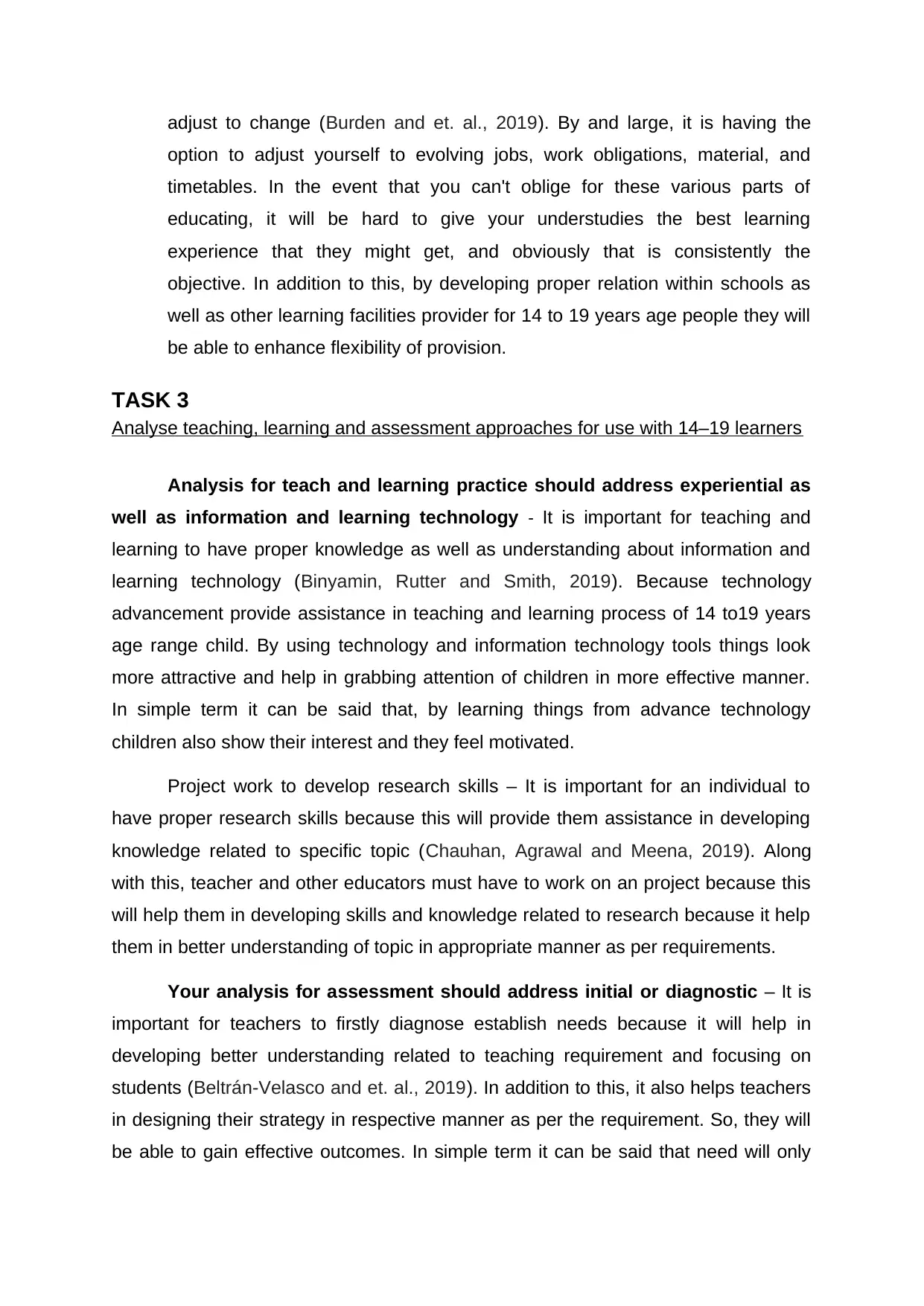
adjust to change (Burden and et. al., 2019). By and large, it is having the
option to adjust yourself to evolving jobs, work obligations, material, and
timetables. In the event that you can't oblige for these various parts of
educating, it will be hard to give your understudies the best learning
experience that they might get, and obviously that is consistently the
objective. In addition to this, by developing proper relation within schools as
well as other learning facilities provider for 14 to 19 years age people they will
be able to enhance flexibility of provision.
TASK 3
Analyse teaching, learning and assessment approaches for use with 14–19 learners
Analysis for teach and learning practice should address experiential as
well as information and learning technology - It is important for teaching and
learning to have proper knowledge as well as understanding about information and
learning technology (Binyamin, Rutter and Smith, 2019). Because technology
advancement provide assistance in teaching and learning process of 14 to19 years
age range child. By using technology and information technology tools things look
more attractive and help in grabbing attention of children in more effective manner.
In simple term it can be said that, by learning things from advance technology
children also show their interest and they feel motivated.
Project work to develop research skills – It is important for an individual to
have proper research skills because this will provide them assistance in developing
knowledge related to specific topic (Chauhan, Agrawal and Meena, 2019). Along
with this, teacher and other educators must have to work on an project because this
will help them in developing skills and knowledge related to research because it help
them in better understanding of topic in appropriate manner as per requirements.
Your analysis for assessment should address initial or diagnostic – It is
important for teachers to firstly diagnose establish needs because it will help in
developing better understanding related to teaching requirement and focusing on
students (Beltrán-Velasco and et. al., 2019). In addition to this, it also helps teachers
in designing their strategy in respective manner as per the requirement. So, they will
be able to gain effective outcomes. In simple term it can be said that need will only
option to adjust yourself to evolving jobs, work obligations, material, and
timetables. In the event that you can't oblige for these various parts of
educating, it will be hard to give your understudies the best learning
experience that they might get, and obviously that is consistently the
objective. In addition to this, by developing proper relation within schools as
well as other learning facilities provider for 14 to 19 years age people they will
be able to enhance flexibility of provision.
TASK 3
Analyse teaching, learning and assessment approaches for use with 14–19 learners
Analysis for teach and learning practice should address experiential as
well as information and learning technology - It is important for teaching and
learning to have proper knowledge as well as understanding about information and
learning technology (Binyamin, Rutter and Smith, 2019). Because technology
advancement provide assistance in teaching and learning process of 14 to19 years
age range child. By using technology and information technology tools things look
more attractive and help in grabbing attention of children in more effective manner.
In simple term it can be said that, by learning things from advance technology
children also show their interest and they feel motivated.
Project work to develop research skills – It is important for an individual to
have proper research skills because this will provide them assistance in developing
knowledge related to specific topic (Chauhan, Agrawal and Meena, 2019). Along
with this, teacher and other educators must have to work on an project because this
will help them in developing skills and knowledge related to research because it help
them in better understanding of topic in appropriate manner as per requirements.
Your analysis for assessment should address initial or diagnostic – It is
important for teachers to firstly diagnose establish needs because it will help in
developing better understanding related to teaching requirement and focusing on
students (Beltrán-Velasco and et. al., 2019). In addition to this, it also helps teachers
in designing their strategy in respective manner as per the requirement. So, they will
be able to gain effective outcomes. In simple term it can be said that need will only
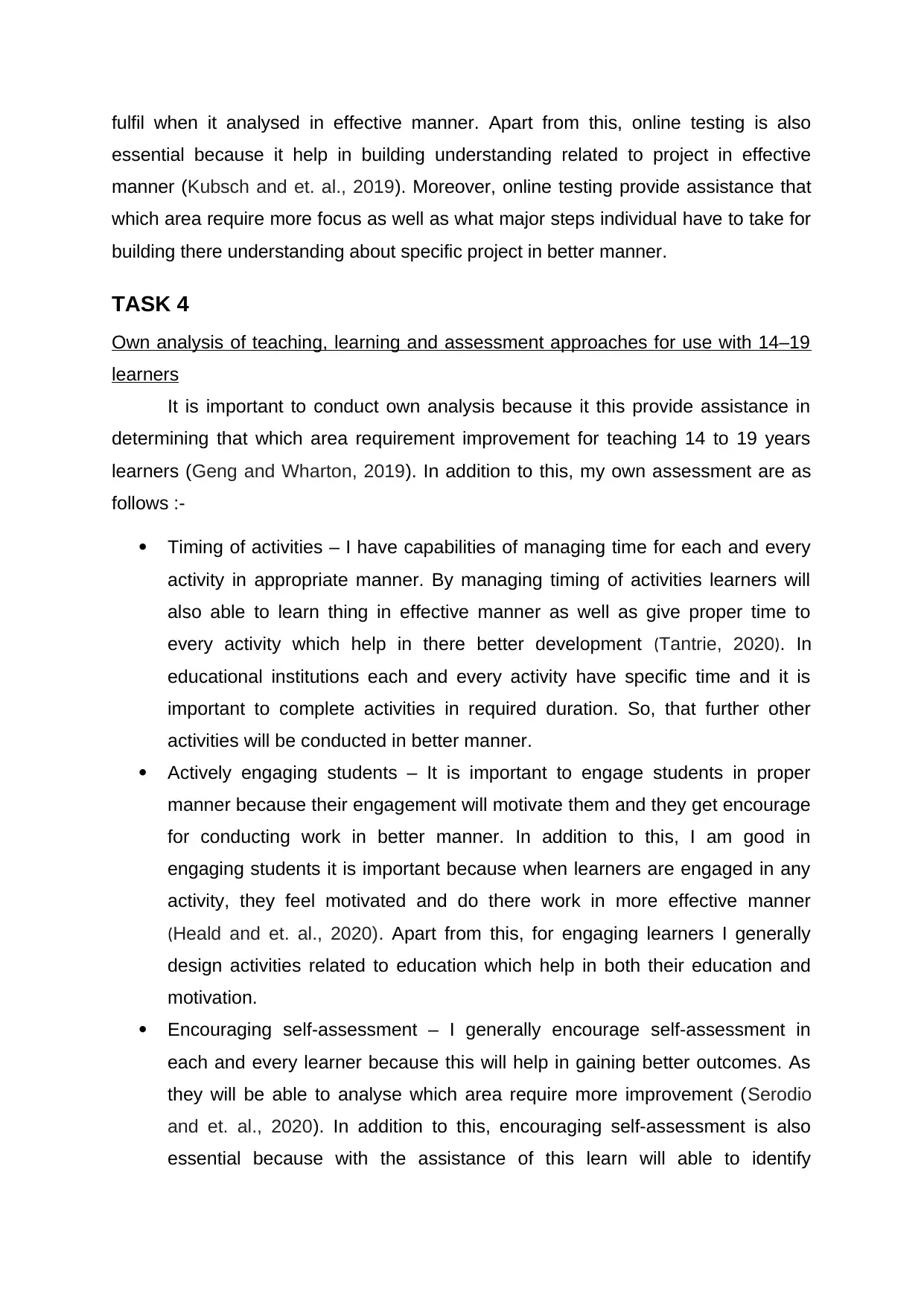
fulfil when it analysed in effective manner. Apart from this, online testing is also
essential because it help in building understanding related to project in effective
manner (Kubsch and et. al., 2019). Moreover, online testing provide assistance that
which area require more focus as well as what major steps individual have to take for
building there understanding about specific project in better manner.
TASK 4
Own analysis of teaching, learning and assessment approaches for use with 14–19
learners
It is important to conduct own analysis because it this provide assistance in
determining that which area requirement improvement for teaching 14 to 19 years
learners (Geng and Wharton, 2019). In addition to this, my own assessment are as
follows :-
Timing of activities – I have capabilities of managing time for each and every
activity in appropriate manner. By managing timing of activities learners will
also able to learn thing in effective manner as well as give proper time to
every activity which help in there better development (Tantrie, 2020). In
educational institutions each and every activity have specific time and it is
important to complete activities in required duration. So, that further other
activities will be conducted in better manner.
Actively engaging students – It is important to engage students in proper
manner because their engagement will motivate them and they get encourage
for conducting work in better manner. In addition to this, I am good in
engaging students it is important because when learners are engaged in any
activity, they feel motivated and do there work in more effective manner
(Heald and et. al., 2020). Apart from this, for engaging learners I generally
design activities related to education which help in both their education and
motivation.
Encouraging self-assessment – I generally encourage self-assessment in
each and every learner because this will help in gaining better outcomes. As
they will be able to analyse which area require more improvement (Serodio
and et. al., 2020). In addition to this, encouraging self-assessment is also
essential because with the assistance of this learn will able to identify
essential because it help in building understanding related to project in effective
manner (Kubsch and et. al., 2019). Moreover, online testing provide assistance that
which area require more focus as well as what major steps individual have to take for
building there understanding about specific project in better manner.
TASK 4
Own analysis of teaching, learning and assessment approaches for use with 14–19
learners
It is important to conduct own analysis because it this provide assistance in
determining that which area requirement improvement for teaching 14 to 19 years
learners (Geng and Wharton, 2019). In addition to this, my own assessment are as
follows :-
Timing of activities – I have capabilities of managing time for each and every
activity in appropriate manner. By managing timing of activities learners will
also able to learn thing in effective manner as well as give proper time to
every activity which help in there better development (Tantrie, 2020). In
educational institutions each and every activity have specific time and it is
important to complete activities in required duration. So, that further other
activities will be conducted in better manner.
Actively engaging students – It is important to engage students in proper
manner because their engagement will motivate them and they get encourage
for conducting work in better manner. In addition to this, I am good in
engaging students it is important because when learners are engaged in any
activity, they feel motivated and do there work in more effective manner
(Heald and et. al., 2020). Apart from this, for engaging learners I generally
design activities related to education which help in both their education and
motivation.
Encouraging self-assessment – I generally encourage self-assessment in
each and every learner because this will help in gaining better outcomes. As
they will be able to analyse which area require more improvement (Serodio
and et. al., 2020). In addition to this, encouraging self-assessment is also
essential because with the assistance of this learn will able to identify
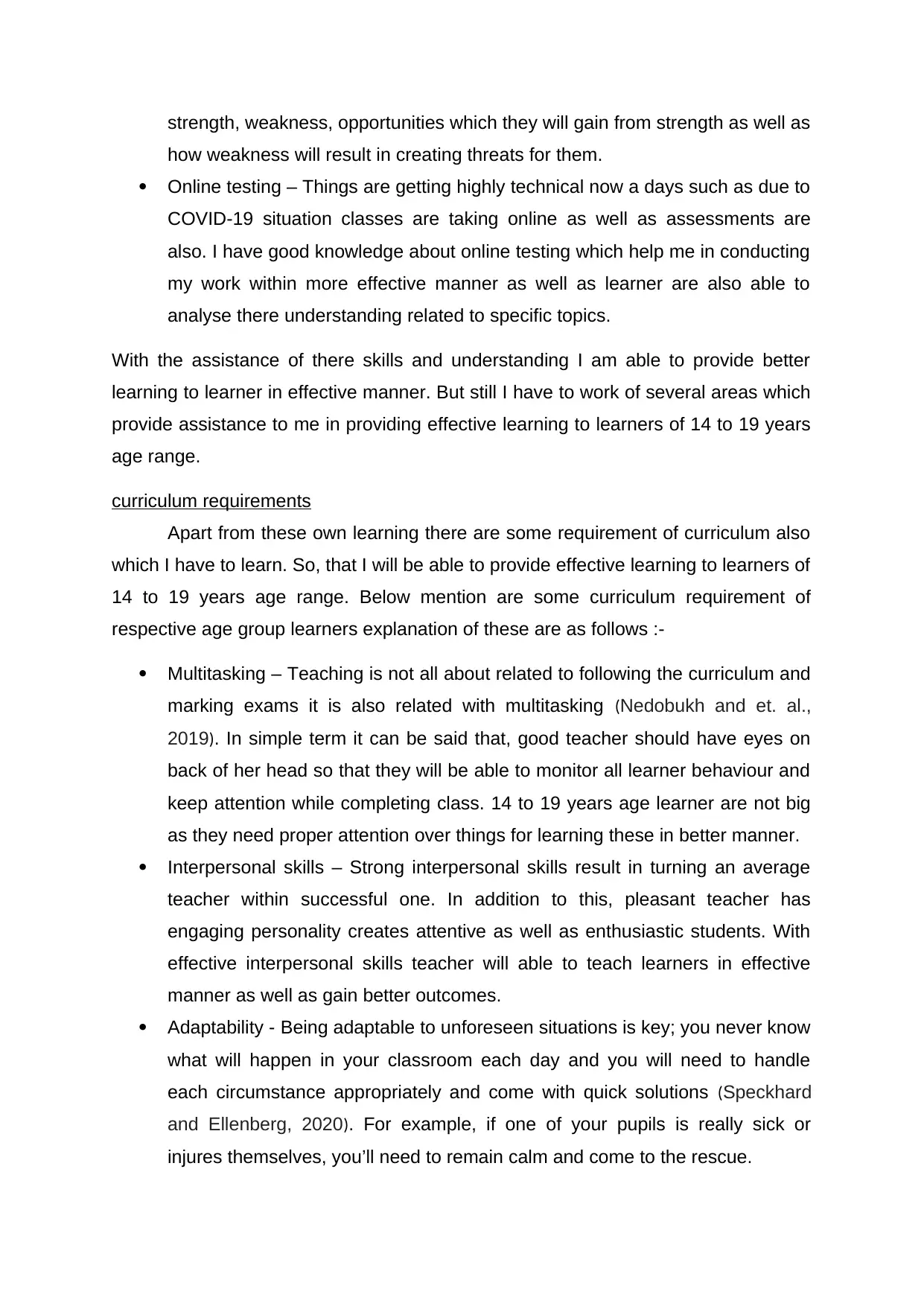
strength, weakness, opportunities which they will gain from strength as well as
how weakness will result in creating threats for them.
Online testing – Things are getting highly technical now a days such as due to
COVID-19 situation classes are taking online as well as assessments are
also. I have good knowledge about online testing which help me in conducting
my work within more effective manner as well as learner are also able to
analyse there understanding related to specific topics.
With the assistance of there skills and understanding I am able to provide better
learning to learner in effective manner. But still I have to work of several areas which
provide assistance to me in providing effective learning to learners of 14 to 19 years
age range.
curriculum requirements
Apart from these own learning there are some requirement of curriculum also
which I have to learn. So, that I will be able to provide effective learning to learners of
14 to 19 years age range. Below mention are some curriculum requirement of
respective age group learners explanation of these are as follows :-
Multitasking – Teaching is not all about related to following the curriculum and
marking exams it is also related with multitasking (Nedobukh and et. al.,
2019). In simple term it can be said that, good teacher should have eyes on
back of her head so that they will be able to monitor all learner behaviour and
keep attention while completing class. 14 to 19 years age learner are not big
as they need proper attention over things for learning these in better manner.
Interpersonal skills – Strong interpersonal skills result in turning an average
teacher within successful one. In addition to this, pleasant teacher has
engaging personality creates attentive as well as enthusiastic students. With
effective interpersonal skills teacher will able to teach learners in effective
manner as well as gain better outcomes.
Adaptability - Being adaptable to unforeseen situations is key; you never know
what will happen in your classroom each day and you will need to handle
each circumstance appropriately and come with quick solutions (Speckhard
and Ellenberg, 2020). For example, if one of your pupils is really sick or
injures themselves, you’ll need to remain calm and come to the rescue.
how weakness will result in creating threats for them.
Online testing – Things are getting highly technical now a days such as due to
COVID-19 situation classes are taking online as well as assessments are
also. I have good knowledge about online testing which help me in conducting
my work within more effective manner as well as learner are also able to
analyse there understanding related to specific topics.
With the assistance of there skills and understanding I am able to provide better
learning to learner in effective manner. But still I have to work of several areas which
provide assistance to me in providing effective learning to learners of 14 to 19 years
age range.
curriculum requirements
Apart from these own learning there are some requirement of curriculum also
which I have to learn. So, that I will be able to provide effective learning to learners of
14 to 19 years age range. Below mention are some curriculum requirement of
respective age group learners explanation of these are as follows :-
Multitasking – Teaching is not all about related to following the curriculum and
marking exams it is also related with multitasking (Nedobukh and et. al.,
2019). In simple term it can be said that, good teacher should have eyes on
back of her head so that they will be able to monitor all learner behaviour and
keep attention while completing class. 14 to 19 years age learner are not big
as they need proper attention over things for learning these in better manner.
Interpersonal skills – Strong interpersonal skills result in turning an average
teacher within successful one. In addition to this, pleasant teacher has
engaging personality creates attentive as well as enthusiastic students. With
effective interpersonal skills teacher will able to teach learners in effective
manner as well as gain better outcomes.
Adaptability - Being adaptable to unforeseen situations is key; you never know
what will happen in your classroom each day and you will need to handle
each circumstance appropriately and come with quick solutions (Speckhard
and Ellenberg, 2020). For example, if one of your pupils is really sick or
injures themselves, you’ll need to remain calm and come to the rescue.
Secure Best Marks with AI Grader
Need help grading? Try our AI Grader for instant feedback on your assignments.
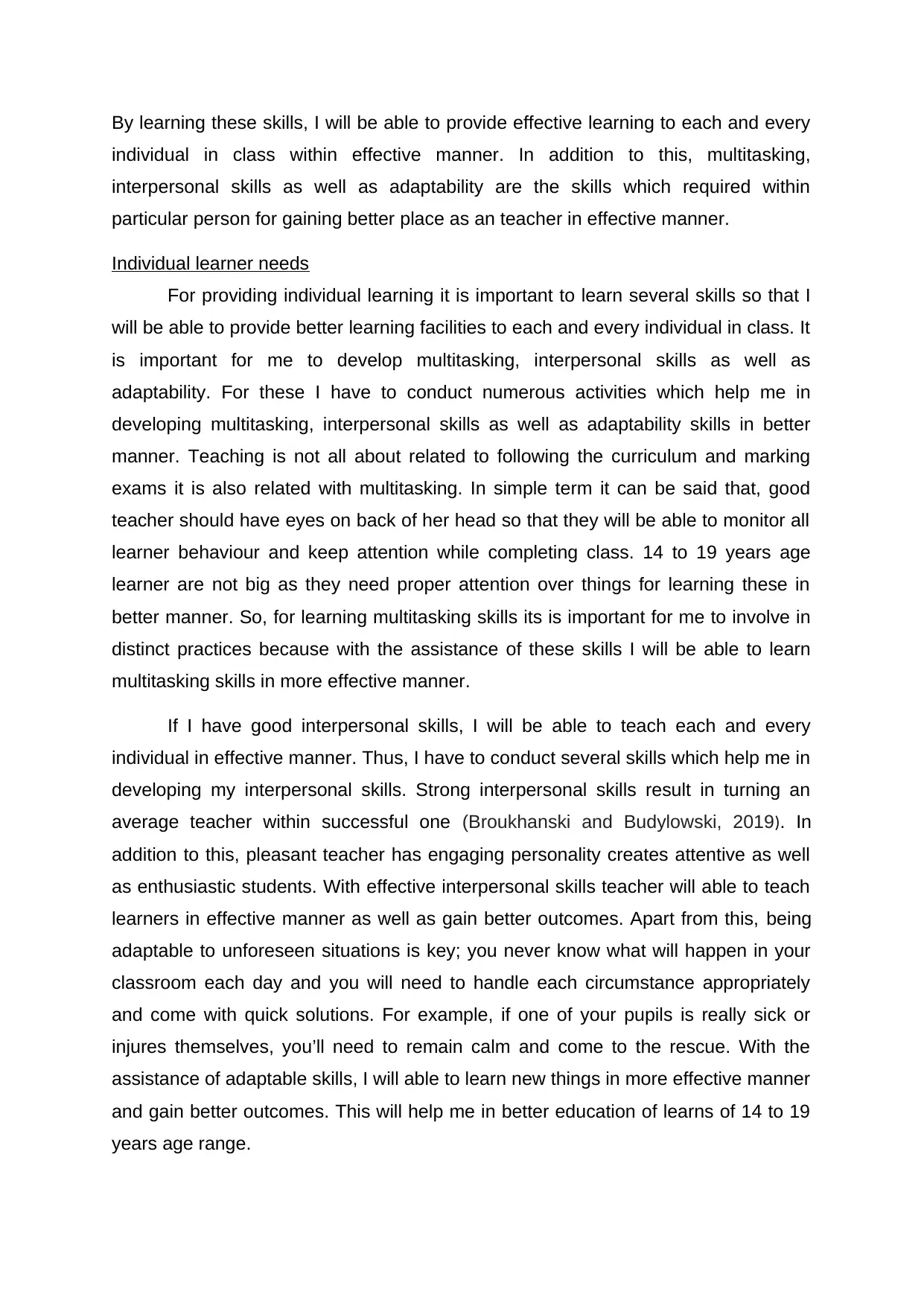
By learning these skills, I will be able to provide effective learning to each and every
individual in class within effective manner. In addition to this, multitasking,
interpersonal skills as well as adaptability are the skills which required within
particular person for gaining better place as an teacher in effective manner.
Individual learner needs
For providing individual learning it is important to learn several skills so that I
will be able to provide better learning facilities to each and every individual in class. It
is important for me to develop multitasking, interpersonal skills as well as
adaptability. For these I have to conduct numerous activities which help me in
developing multitasking, interpersonal skills as well as adaptability skills in better
manner. Teaching is not all about related to following the curriculum and marking
exams it is also related with multitasking. In simple term it can be said that, good
teacher should have eyes on back of her head so that they will be able to monitor all
learner behaviour and keep attention while completing class. 14 to 19 years age
learner are not big as they need proper attention over things for learning these in
better manner. So, for learning multitasking skills its is important for me to involve in
distinct practices because with the assistance of these skills I will be able to learn
multitasking skills in more effective manner.
If I have good interpersonal skills, I will be able to teach each and every
individual in effective manner. Thus, I have to conduct several skills which help me in
developing my interpersonal skills. Strong interpersonal skills result in turning an
average teacher within successful one (Broukhanski and Budylowski, 2019). In
addition to this, pleasant teacher has engaging personality creates attentive as well
as enthusiastic students. With effective interpersonal skills teacher will able to teach
learners in effective manner as well as gain better outcomes. Apart from this, being
adaptable to unforeseen situations is key; you never know what will happen in your
classroom each day and you will need to handle each circumstance appropriately
and come with quick solutions. For example, if one of your pupils is really sick or
injures themselves, you’ll need to remain calm and come to the rescue. With the
assistance of adaptable skills, I will able to learn new things in more effective manner
and gain better outcomes. This will help me in better education of learns of 14 to 19
years age range.
individual in class within effective manner. In addition to this, multitasking,
interpersonal skills as well as adaptability are the skills which required within
particular person for gaining better place as an teacher in effective manner.
Individual learner needs
For providing individual learning it is important to learn several skills so that I
will be able to provide better learning facilities to each and every individual in class. It
is important for me to develop multitasking, interpersonal skills as well as
adaptability. For these I have to conduct numerous activities which help me in
developing multitasking, interpersonal skills as well as adaptability skills in better
manner. Teaching is not all about related to following the curriculum and marking
exams it is also related with multitasking. In simple term it can be said that, good
teacher should have eyes on back of her head so that they will be able to monitor all
learner behaviour and keep attention while completing class. 14 to 19 years age
learner are not big as they need proper attention over things for learning these in
better manner. So, for learning multitasking skills its is important for me to involve in
distinct practices because with the assistance of these skills I will be able to learn
multitasking skills in more effective manner.
If I have good interpersonal skills, I will be able to teach each and every
individual in effective manner. Thus, I have to conduct several skills which help me in
developing my interpersonal skills. Strong interpersonal skills result in turning an
average teacher within successful one (Broukhanski and Budylowski, 2019). In
addition to this, pleasant teacher has engaging personality creates attentive as well
as enthusiastic students. With effective interpersonal skills teacher will able to teach
learners in effective manner as well as gain better outcomes. Apart from this, being
adaptable to unforeseen situations is key; you never know what will happen in your
classroom each day and you will need to handle each circumstance appropriately
and come with quick solutions. For example, if one of your pupils is really sick or
injures themselves, you’ll need to remain calm and come to the rescue. With the
assistance of adaptable skills, I will able to learn new things in more effective manner
and gain better outcomes. This will help me in better education of learns of 14 to 19
years age range.
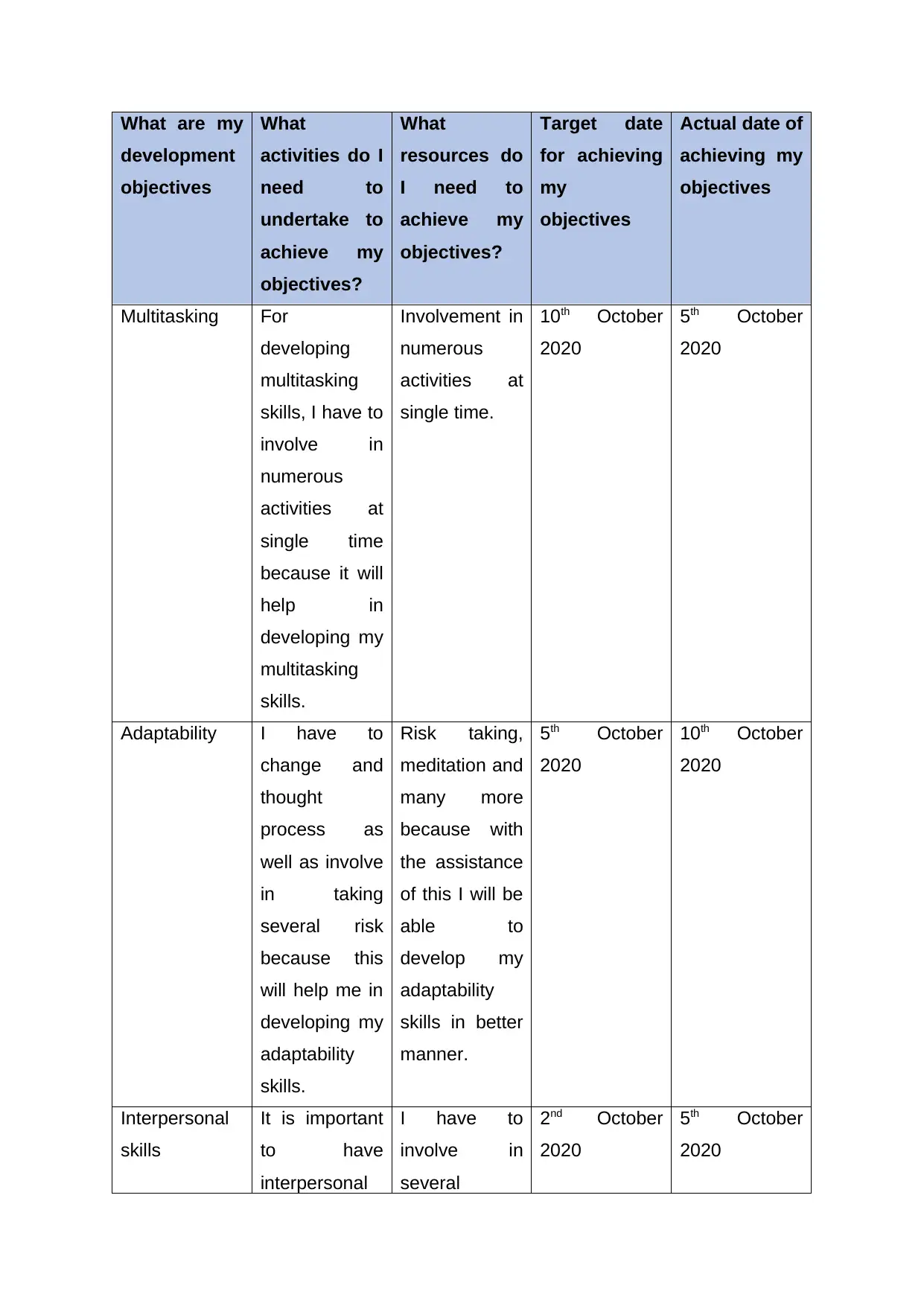
What are my
development
objectives
What
activities do I
need to
undertake to
achieve my
objectives?
What
resources do
I need to
achieve my
objectives?
Target date
for achieving
my
objectives
Actual date of
achieving my
objectives
Multitasking For
developing
multitasking
skills, I have to
involve in
numerous
activities at
single time
because it will
help in
developing my
multitasking
skills.
Involvement in
numerous
activities at
single time.
10th October
2020
5th October
2020
Adaptability I have to
change and
thought
process as
well as involve
in taking
several risk
because this
will help me in
developing my
adaptability
skills.
Risk taking,
meditation and
many more
because with
the assistance
of this I will be
able to
develop my
adaptability
skills in better
manner.
5th October
2020
10th October
2020
Interpersonal
skills
It is important
to have
interpersonal
I have to
involve in
several
2nd October
2020
5th October
2020
development
objectives
What
activities do I
need to
undertake to
achieve my
objectives?
What
resources do
I need to
achieve my
objectives?
Target date
for achieving
my
objectives
Actual date of
achieving my
objectives
Multitasking For
developing
multitasking
skills, I have to
involve in
numerous
activities at
single time
because it will
help in
developing my
multitasking
skills.
Involvement in
numerous
activities at
single time.
10th October
2020
5th October
2020
Adaptability I have to
change and
thought
process as
well as involve
in taking
several risk
because this
will help me in
developing my
adaptability
skills.
Risk taking,
meditation and
many more
because with
the assistance
of this I will be
able to
develop my
adaptability
skills in better
manner.
5th October
2020
10th October
2020
Interpersonal
skills
It is important
to have
interpersonal
I have to
involve in
several
2nd October
2020
5th October
2020
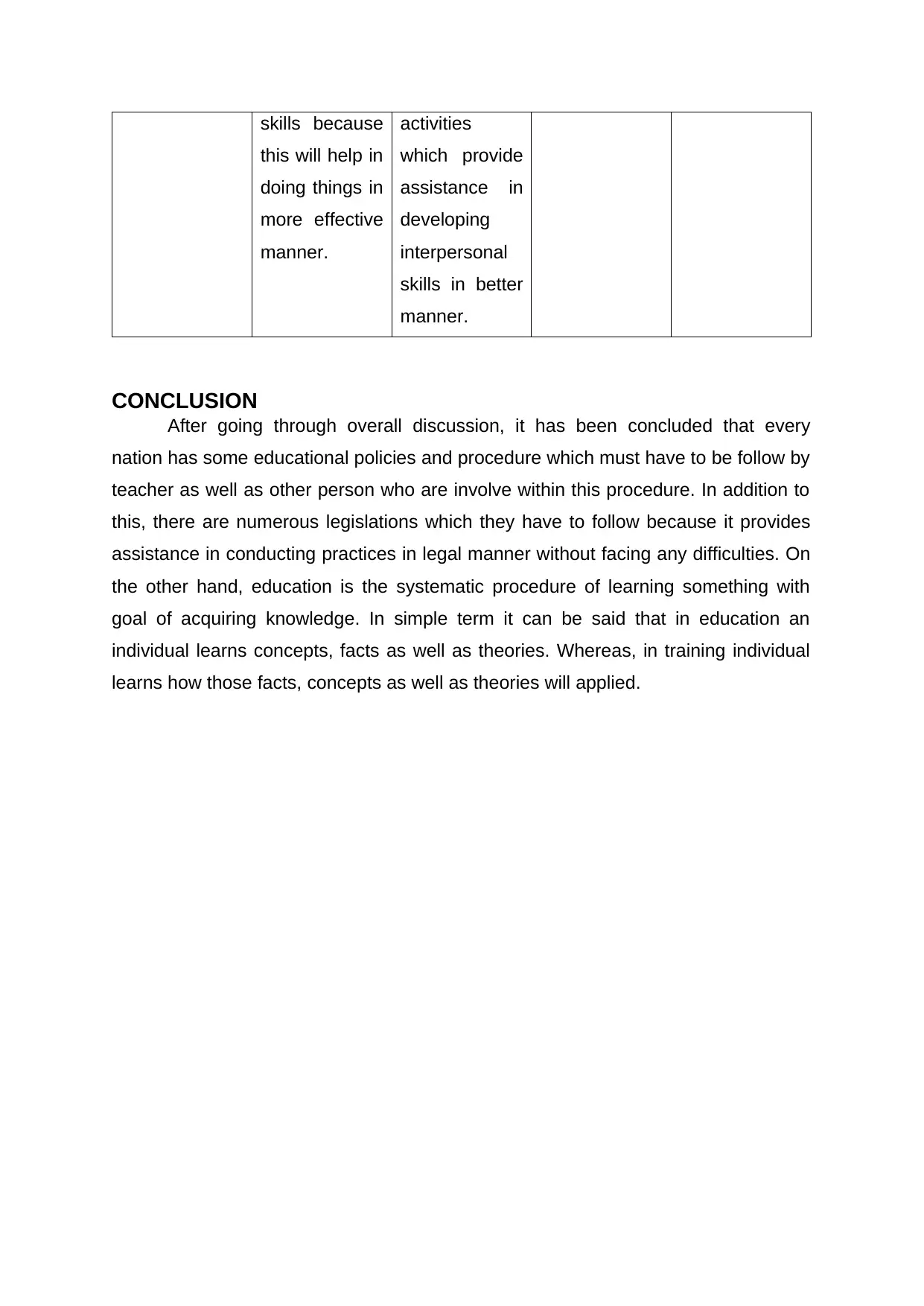
skills because
this will help in
doing things in
more effective
manner.
activities
which provide
assistance in
developing
interpersonal
skills in better
manner.
CONCLUSION
After going through overall discussion, it has been concluded that every
nation has some educational policies and procedure which must have to be follow by
teacher as well as other person who are involve within this procedure. In addition to
this, there are numerous legislations which they have to follow because it provides
assistance in conducting practices in legal manner without facing any difficulties. On
the other hand, education is the systematic procedure of learning something with
goal of acquiring knowledge. In simple term it can be said that in education an
individual learns concepts, facts as well as theories. Whereas, in training individual
learns how those facts, concepts as well as theories will applied.
this will help in
doing things in
more effective
manner.
activities
which provide
assistance in
developing
interpersonal
skills in better
manner.
CONCLUSION
After going through overall discussion, it has been concluded that every
nation has some educational policies and procedure which must have to be follow by
teacher as well as other person who are involve within this procedure. In addition to
this, there are numerous legislations which they have to follow because it provides
assistance in conducting practices in legal manner without facing any difficulties. On
the other hand, education is the systematic procedure of learning something with
goal of acquiring knowledge. In simple term it can be said that in education an
individual learns concepts, facts as well as theories. Whereas, in training individual
learns how those facts, concepts as well as theories will applied.
Paraphrase This Document
Need a fresh take? Get an instant paraphrase of this document with our AI Paraphraser
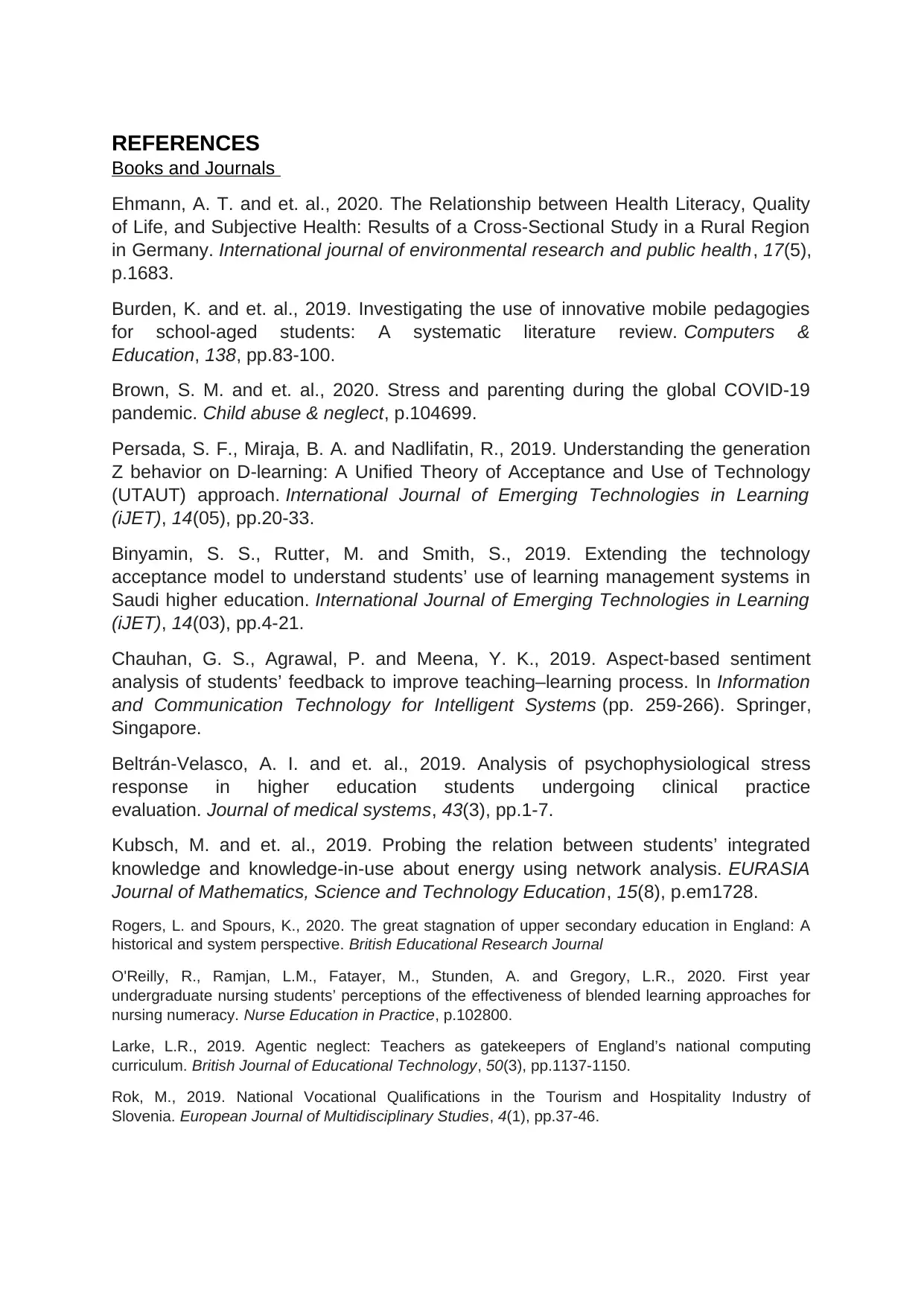
REFERENCES
Books and Journals
Ehmann, A. T. and et. al., 2020. The Relationship between Health Literacy, Quality
of Life, and Subjective Health: Results of a Cross-Sectional Study in a Rural Region
in Germany. International journal of environmental research and public health, 17(5),
p.1683.
Burden, K. and et. al., 2019. Investigating the use of innovative mobile pedagogies
for school-aged students: A systematic literature review. Computers &
Education, 138, pp.83-100.
Brown, S. M. and et. al., 2020. Stress and parenting during the global COVID-19
pandemic. Child abuse & neglect, p.104699.
Persada, S. F., Miraja, B. A. and Nadlifatin, R., 2019. Understanding the generation
Z behavior on D-learning: A Unified Theory of Acceptance and Use of Technology
(UTAUT) approach. International Journal of Emerging Technologies in Learning
(iJET), 14(05), pp.20-33.
Binyamin, S. S., Rutter, M. and Smith, S., 2019. Extending the technology
acceptance model to understand students’ use of learning management systems in
Saudi higher education. International Journal of Emerging Technologies in Learning
(iJET), 14(03), pp.4-21.
Chauhan, G. S., Agrawal, P. and Meena, Y. K., 2019. Aspect-based sentiment
analysis of students’ feedback to improve teaching–learning process. In Information
and Communication Technology for Intelligent Systems (pp. 259-266). Springer,
Singapore.
Beltrán-Velasco, A. I. and et. al., 2019. Analysis of psychophysiological stress
response in higher education students undergoing clinical practice
evaluation. Journal of medical systems, 43(3), pp.1-7.
Kubsch, M. and et. al., 2019. Probing the relation between students’ integrated
knowledge and knowledge-in-use about energy using network analysis. EURASIA
Journal of Mathematics, Science and Technology Education, 15(8), p.em1728.
Rogers, L. and Spours, K., 2020. The great stagnation of upper secondary education in England: A
historical and system perspective. British Educational Research Journal
O'Reilly, R., Ramjan, L.M., Fatayer, M., Stunden, A. and Gregory, L.R., 2020. First year
undergraduate nursing students’ perceptions of the effectiveness of blended learning approaches for
nursing numeracy. Nurse Education in Practice, p.102800.
Larke, L.R., 2019. Agentic neglect: Teachers as gatekeepers of England’s national computing
curriculum. British Journal of Educational Technology, 50(3), pp.1137-1150.
Rok, M., 2019. National Vocational Qualifications in the Tourism and Hospitality Industry of
Slovenia. European Journal of Multidisciplinary Studies, 4(1), pp.37-46.
Books and Journals
Ehmann, A. T. and et. al., 2020. The Relationship between Health Literacy, Quality
of Life, and Subjective Health: Results of a Cross-Sectional Study in a Rural Region
in Germany. International journal of environmental research and public health, 17(5),
p.1683.
Burden, K. and et. al., 2019. Investigating the use of innovative mobile pedagogies
for school-aged students: A systematic literature review. Computers &
Education, 138, pp.83-100.
Brown, S. M. and et. al., 2020. Stress and parenting during the global COVID-19
pandemic. Child abuse & neglect, p.104699.
Persada, S. F., Miraja, B. A. and Nadlifatin, R., 2019. Understanding the generation
Z behavior on D-learning: A Unified Theory of Acceptance and Use of Technology
(UTAUT) approach. International Journal of Emerging Technologies in Learning
(iJET), 14(05), pp.20-33.
Binyamin, S. S., Rutter, M. and Smith, S., 2019. Extending the technology
acceptance model to understand students’ use of learning management systems in
Saudi higher education. International Journal of Emerging Technologies in Learning
(iJET), 14(03), pp.4-21.
Chauhan, G. S., Agrawal, P. and Meena, Y. K., 2019. Aspect-based sentiment
analysis of students’ feedback to improve teaching–learning process. In Information
and Communication Technology for Intelligent Systems (pp. 259-266). Springer,
Singapore.
Beltrán-Velasco, A. I. and et. al., 2019. Analysis of psychophysiological stress
response in higher education students undergoing clinical practice
evaluation. Journal of medical systems, 43(3), pp.1-7.
Kubsch, M. and et. al., 2019. Probing the relation between students’ integrated
knowledge and knowledge-in-use about energy using network analysis. EURASIA
Journal of Mathematics, Science and Technology Education, 15(8), p.em1728.
Rogers, L. and Spours, K., 2020. The great stagnation of upper secondary education in England: A
historical and system perspective. British Educational Research Journal
O'Reilly, R., Ramjan, L.M., Fatayer, M., Stunden, A. and Gregory, L.R., 2020. First year
undergraduate nursing students’ perceptions of the effectiveness of blended learning approaches for
nursing numeracy. Nurse Education in Practice, p.102800.
Larke, L.R., 2019. Agentic neglect: Teachers as gatekeepers of England’s national computing
curriculum. British Journal of Educational Technology, 50(3), pp.1137-1150.
Rok, M., 2019. National Vocational Qualifications in the Tourism and Hospitality Industry of
Slovenia. European Journal of Multidisciplinary Studies, 4(1), pp.37-46.
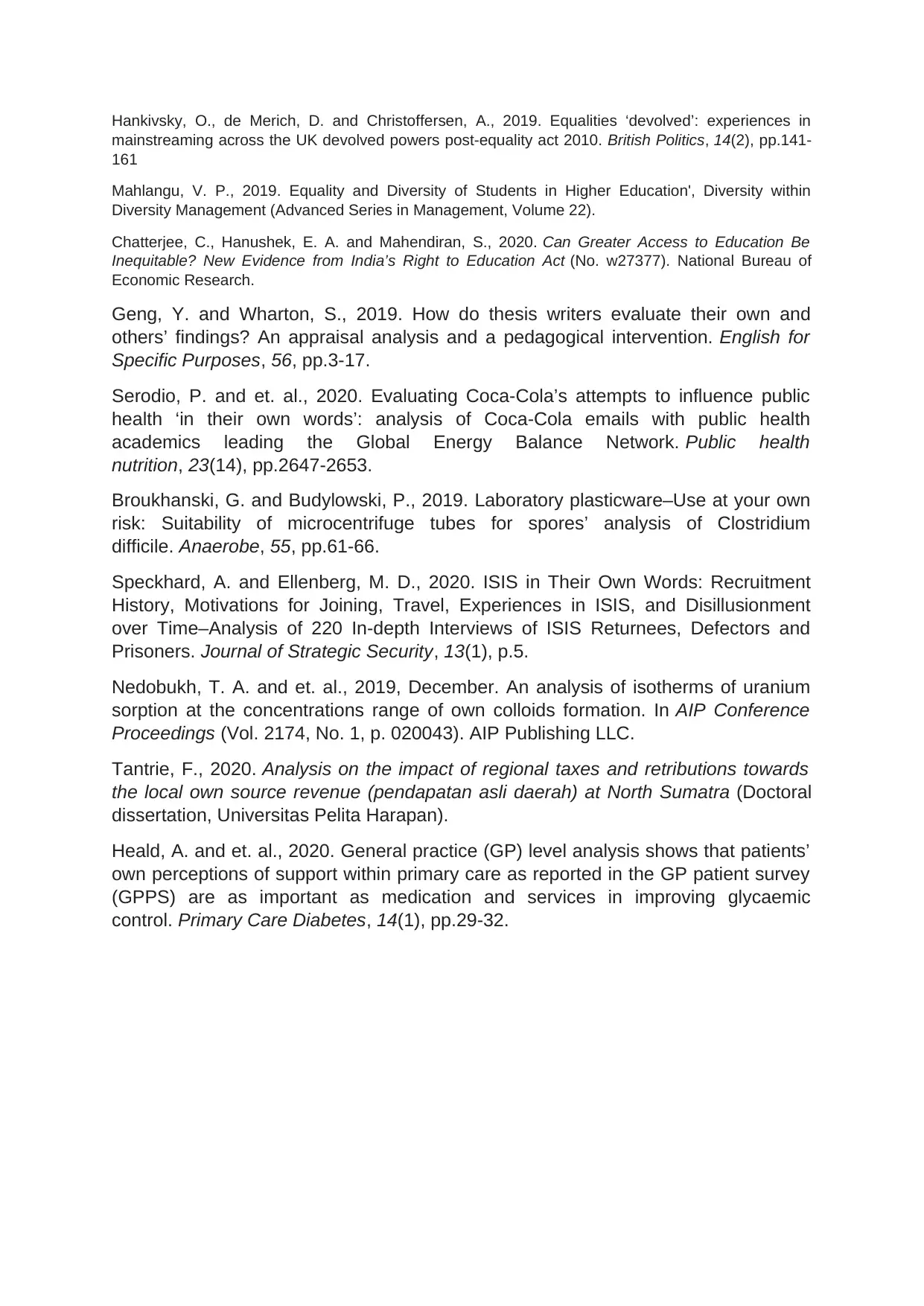
Hankivsky, O., de Merich, D. and Christoffersen, A., 2019. Equalities ‘devolved’: experiences in
mainstreaming across the UK devolved powers post-equality act 2010. British Politics, 14(2), pp.141-
161
Mahlangu, V. P., 2019. Equality and Diversity of Students in Higher Education', Diversity within
Diversity Management (Advanced Series in Management, Volume 22).
Chatterjee, C., Hanushek, E. A. and Mahendiran, S., 2020. Can Greater Access to Education Be
Inequitable? New Evidence from India’s Right to Education Act (No. w27377). National Bureau of
Economic Research.
Geng, Y. and Wharton, S., 2019. How do thesis writers evaluate their own and
others’ findings? An appraisal analysis and a pedagogical intervention. English for
Specific Purposes, 56, pp.3-17.
Serodio, P. and et. al., 2020. Evaluating Coca-Cola’s attempts to influence public
health ‘in their own words’: analysis of Coca-Cola emails with public health
academics leading the Global Energy Balance Network. Public health
nutrition, 23(14), pp.2647-2653.
Broukhanski, G. and Budylowski, P., 2019. Laboratory plasticware–Use at your own
risk: Suitability of microcentrifuge tubes for spores’ analysis of Clostridium
difficile. Anaerobe, 55, pp.61-66.
Speckhard, A. and Ellenberg, M. D., 2020. ISIS in Their Own Words: Recruitment
History, Motivations for Joining, Travel, Experiences in ISIS, and Disillusionment
over Time–Analysis of 220 In-depth Interviews of ISIS Returnees, Defectors and
Prisoners. Journal of Strategic Security, 13(1), p.5.
Nedobukh, T. A. and et. al., 2019, December. An analysis of isotherms of uranium
sorption at the concentrations range of own colloids formation. In AIP Conference
Proceedings (Vol. 2174, No. 1, p. 020043). AIP Publishing LLC.
Tantrie, F., 2020. Analysis on the impact of regional taxes and retributions towards
the local own source revenue (pendapatan asli daerah) at North Sumatra (Doctoral
dissertation, Universitas Pelita Harapan).
Heald, A. and et. al., 2020. General practice (GP) level analysis shows that patients’
own perceptions of support within primary care as reported in the GP patient survey
(GPPS) are as important as medication and services in improving glycaemic
control. Primary Care Diabetes, 14(1), pp.29-32.
mainstreaming across the UK devolved powers post-equality act 2010. British Politics, 14(2), pp.141-
161
Mahlangu, V. P., 2019. Equality and Diversity of Students in Higher Education', Diversity within
Diversity Management (Advanced Series in Management, Volume 22).
Chatterjee, C., Hanushek, E. A. and Mahendiran, S., 2020. Can Greater Access to Education Be
Inequitable? New Evidence from India’s Right to Education Act (No. w27377). National Bureau of
Economic Research.
Geng, Y. and Wharton, S., 2019. How do thesis writers evaluate their own and
others’ findings? An appraisal analysis and a pedagogical intervention. English for
Specific Purposes, 56, pp.3-17.
Serodio, P. and et. al., 2020. Evaluating Coca-Cola’s attempts to influence public
health ‘in their own words’: analysis of Coca-Cola emails with public health
academics leading the Global Energy Balance Network. Public health
nutrition, 23(14), pp.2647-2653.
Broukhanski, G. and Budylowski, P., 2019. Laboratory plasticware–Use at your own
risk: Suitability of microcentrifuge tubes for spores’ analysis of Clostridium
difficile. Anaerobe, 55, pp.61-66.
Speckhard, A. and Ellenberg, M. D., 2020. ISIS in Their Own Words: Recruitment
History, Motivations for Joining, Travel, Experiences in ISIS, and Disillusionment
over Time–Analysis of 220 In-depth Interviews of ISIS Returnees, Defectors and
Prisoners. Journal of Strategic Security, 13(1), p.5.
Nedobukh, T. A. and et. al., 2019, December. An analysis of isotherms of uranium
sorption at the concentrations range of own colloids formation. In AIP Conference
Proceedings (Vol. 2174, No. 1, p. 020043). AIP Publishing LLC.
Tantrie, F., 2020. Analysis on the impact of regional taxes and retributions towards
the local own source revenue (pendapatan asli daerah) at North Sumatra (Doctoral
dissertation, Universitas Pelita Harapan).
Heald, A. and et. al., 2020. General practice (GP) level analysis shows that patients’
own perceptions of support within primary care as reported in the GP patient survey
(GPPS) are as important as medication and services in improving glycaemic
control. Primary Care Diabetes, 14(1), pp.29-32.
1 out of 15
Related Documents
Your All-in-One AI-Powered Toolkit for Academic Success.
+13062052269
info@desklib.com
Available 24*7 on WhatsApp / Email
![[object Object]](/_next/static/media/star-bottom.7253800d.svg)
Unlock your academic potential
© 2024 | Zucol Services PVT LTD | All rights reserved.




